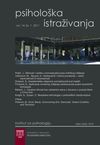'Filozofija za decu' kao kreiranje zone narednog razvoja
„Philosophy for Children” as Creating the Zone of Proximal Development
Author(s): Jelena Pešić, Ana ZrenjaninSubject(s): Philosophy, Psychology, Cognitive Psychology
Published by: Филозофски факултет, Универзитет у Београду
Keywords: Vygotsky; Lipman; critical thinking; metacognition;
Summary/Abstract: In this paper, we analyze the conception, objectives and methodology of the „Philosophy for Children”, a programme aimed at fostering critical thinking in children aged five to eighteen. The analysis is based on the key concepts and principles of Vygotsky’s developmental theory. We believe that discussing the manner in which these concepts and principles are embodied in one successful and influential thinking skills programme could enhance the concept of the zone of proximal development, as well as our understanding of the processes through which cognitive competencies are co-constructed. The practical relevance of the analysis refers to a controversial issue of whether higher-order cognitive skills can be fostered at a young age. The analysis reveals that Lipman has creatively applied Vygotsky’s idea of the formative role of spontaneous and scientific concepts interaction, thus focusing on the metacognitive development. Consequently, the methodological procedures are language-based, using the narrative, dialogical and rational forms of discourse as mediation tools for developing the skills of logical reasoning and critical thinking. Philosophical novels, as an innovative educational genre, exemplify Lipman’s contribution to enriching the concept of direct cultural interaction, which has generally been less studied within the socio-cultural approach. The analysis of gradual transformation of group discussion, from monological and mostly anegdotical, through genuine dialogical exchanges, to mastering the procedures and skills of critical dialogue, is one of the most plausible accounts ofVygotsky’s genetic law. The specific role of the teacher, who indirectly guides the discussion through the use of Socratic questioning, expands the concept of finely tuned support and the strategies for creating the zone of proximal development in educational context.
Journal: Psihološka istraživanja
- Issue Year: 17/2014
- Issue No: 2
- Page Range: 191-206
- Page Count: 16
- Language: Serbian

